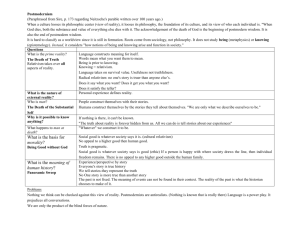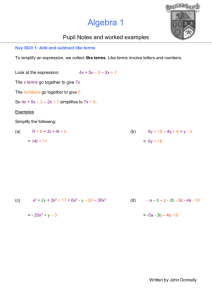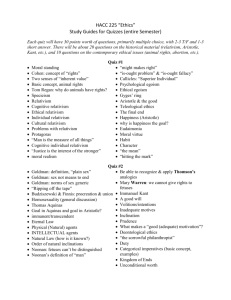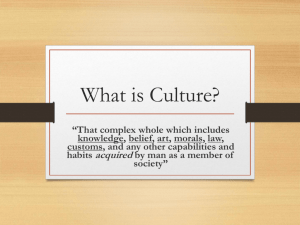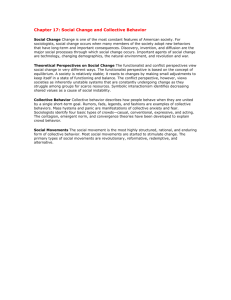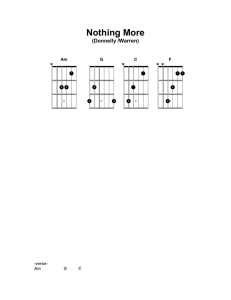HUMAN RIGHTS QUESTION BANK
advertisement
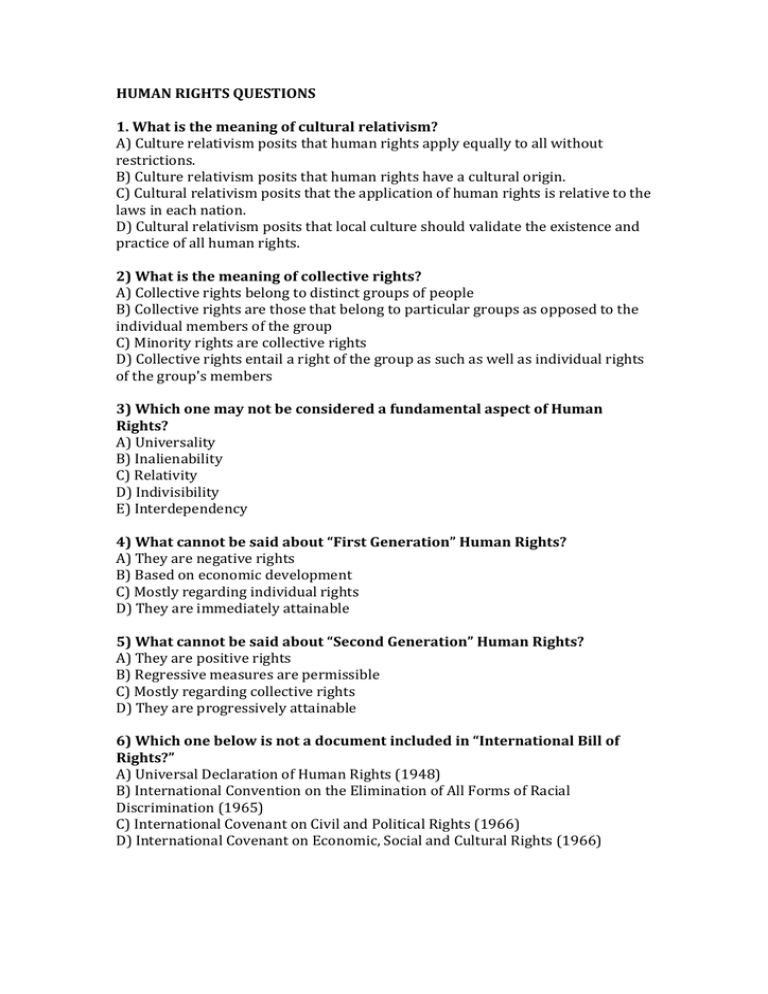
HUMAN RIGHTS QUESTIONS 1. What is the meaning of cultural relativism? A) Culture relativism posits that human rights apply equally to all without restrictions. B) Culture relativism posits that human rights have a cultural origin. C) Cultural relativism posits that the application of human rights is relative to the laws in each nation. D) Cultural relativism posits that local culture should validate the existence and practice of all human rights. 2) What is the meaning of collective rights? A) Collective rights belong to distinct groups of people B) Collective rights are those that belong to particular groups as opposed to the individual members of the group C) Minority rights are collective rights D) Collective rights entail a right of the group as such as well as individual rights of the group's members 3) Which one may not be considered a fundamental aspect of Human Rights? A) Universality B) Inalienability C) Relativity D) Indivisibility E) Interdependency 4) What cannot be said about “First Generation” Human Rights? A) They are negative rights B) Based on economic development C) Mostly regarding individual rights D) They are immediately attainable 5) What cannot be said about “Second Generation” Human Rights? A) They are positive rights B) Regressive measures are permissible C) Mostly regarding collective rights D) They are progressively attainable 6) Which one below is not a document included in “International Bill of Rights?” A) Universal Declaration of Human Rights (1948) B) International Convention on the Elimination of All Forms of Racial Discrimination (1965) C) International Covenant on Civil and Political Rights (1966) D) International Covenant on Economic, Social and Cultural Rights (1966) 7) What would not be part of the Realist understanding of Human Rights? A) Human rights exist to protect human dignity B) Human rights are tools for state interests C) Human rights reduce transaction costs D) Human rights reflect existing balance of power 8) Which one is not part of UN Human Rights body? A) Security Council B) General Assembly C) Human Rights Watch D) Economic and Social Council E) Commission on the Status of Women 9) Which one is not part of “jus ad bellum?” A) Having just cause B) Not harming the innocent C) Being a last resort D) Being declared by a proper authority E) Having a reasonable chance of success 10) Which one is not a principle of “jus in bello?” A) Discrimination B) Proportionality C) Retribution D) Responsibility 11) Which one is not a principle of “jus post bellum?” A) Imposing punishment on all-combatants; B) Respecting the rights or traditions of the defeated C) Tempering compensatory claims by the principles of discrimination and proportionality D) The need to rehabilitate or re-educate an aggressor 12) “The duty to prevent and halt genocide and mass atrocities lies first and foremost with the State, but the international community has a role that cannot be blocked by the invocation of sovereignty. Sovereignty no longer exclusively protects States from foreign interference; it is a charge of responsibility where States are accountable for the welfare of their people. This principle is embodied in the concept of the ____________________________” Please fill the blank with the right concept. A) Humanitarian intervention B) Just War C) Responsibility to Protect D) Sovereignty 13) “_______________________ is coercive action by States involving the use of armed force in another State without the consent of its government, with or without authorization from the United Nations Security Council, for the purpose of preventing or putting to a halt gross and massive violations of human rights or international humanitarian law.” Please fill the blank with the right concept. A) Humanitarian intervention B) Just War C) Responsibility to Protect D) Sovereignty 14) According to Jack Donnelly, human rights are ___________________. Please fill the blank with the right concept. A) Timeless B) Universal C) Unchanging D) Absolute 15) “Half of the world’s states have undertaken international legal obligations to implement human rights by becoming parties to the International Human Rights Covenants, and almost all other nations have either signed but not yet ratified the Covenants or have otherwise expressed approval of and commitment to their content.” Above, the author describes which concept? A) Relative ethic component of human rights B) Covenant based protection of human rights C) International normative universality of human rights D) Domestic commitment for protection of human rights 16) Human rights is an interdisciplinary subject. Thus, a comprehensive account of human rights would require combination of, at minimum, the perspectives of ___________________________ . Which discipline below may be used to fill the blank? A) Law B) Political science C) Economics D) Philosophy E) All of the above 17) Human rights are literally the rights one has simply because one is a human being –droits de l’homme, Menschenrechte, “the rights of man.” According to this widely accepted statement, what would be the source of human rights? A) The divine being B) The nature C) Physical facts D) Humanity 18) Jack Donnelly argues that, “If we are to take human rights seriously as the rights one has simply because one is human being, the first step is to understand what it meant to have a right.” Which concept below may be supported by Donnelly’s account on what constitutes “right” as it is used in “human rights?” A) Rectitude B) Protection C) Entitlement D) Utility 19) Some distinct forms of social interaction involve rights. Which social interaction below may not be listed among such social interactions? A) Assertive exercise of a right B) Sovereign exercise of a right C) Direct enjoyment of a right D) Objective enjoyment of a Right 20) “People are most likely to claim their human rights in precisely those instances when they are not enjoying them – i.e. when those rights are not legally recognized or institutionally guaranteed, or when it is not clear who is obligated to fulfill the rights.” This statement refers to which crucial concept introduced by Jack Donnelly? A) The possession-paradox B) The obligation-paradox C) The enforcement-paradox D) The enjoyment-paradox 21) Who are the subjects of human rights? A) States B) Groups C) Individuals D) Organizations 22) “Civil liberties protect selected areas of activity from interference by the state combining “negative” restraints on the state with the idea that a life of dignity requires “positive” intellectual and associational freedoms to engage political discourse and activity.” In this concept, which right may not be categorized under civil liberties according to Universal Declaration on Human Rights? A) Freedom of thought B) Freedom of conscience C) Freedom of association D) Freedom of labor 23) What are the “basic rights” listed by Henry Shue? A) Survival-Protection against torture-Protection against apartheid-Food B) Security-subsistence-liberty C) Life-liberty-property-security D) Freedoms of speech-press and assembly 24) Which statement may not be said about International Criminal Court? A) It is governed by the Rome Statute B) It is the first permanent, treaty based, international criminal court established to help end impunity for the perpetrators of the most serious crimes of concern to the international community. C) It is part of the United Nations system. D) Its seat is at The Hague in the Netherlands. E) The Court’s expenses are partially funded primarily by individuals, corporations and other entities. 25) Which statement may not be said about International Criminal Court? A) The Prosecutor can initiate an investigation on the basis of a referral from any State Party B) The Prosecutor can initiate an investigation on the basis of a referral from any United Nations General Assembly C) The Prosecutor can initiate an investigation on the basis of a referral from the United Nations Security Council. D) The Prosecutor can initiate investigations proprio motu on the basis of information on crimes within the jurisdiction of the Court received from individuals E) The Prosecutor can initiate investigations proprio motu on the basis of information on crimes within the jurisdiction of the Court received from organizations.


